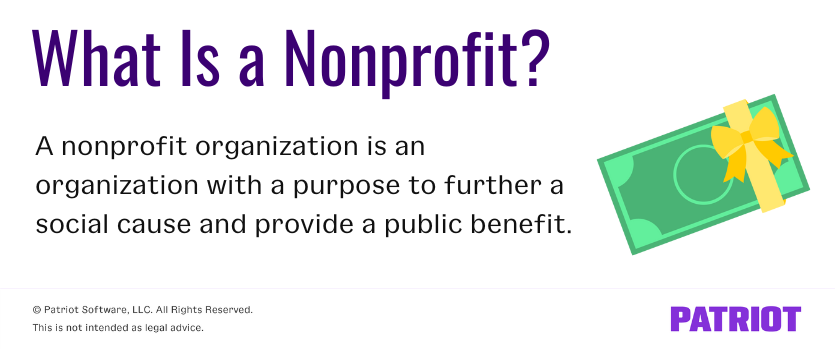Have you ever donated to a charity? What about a hospital or school? If so, you may have given to a nonprofit. But, what is a nonprofit? And, how do they work? Get the answers to all of your burning questions below.
What is a nonprofit organization?
Let’s start with the basics: What does nonprofit mean? A nonprofit organization, or NPO, is an organization with a purpose to further a social cause and provide a public benefit. NPOs use profits to support the organization’s cause or goal, but funds can also pay for other things, such as administrative costs.
Because of its mission, an NPO qualifies for tax-exempt status by the IRS. This means that the nonprofit organization is typically not responsible for paying income tax, property tax, or sales tax. But to be tax exempt, most organizations must apply for tax-exempt status through the IRS.
Here are a few nonprofit organization examples:
- Hospitals
- Public schools
- National charities
- Foundations
- Churches (e.g., synagogues, mosques, and temples)
- Museums
- Research institutes
- Labor unions
Donations you make to a nonprofit are typically tax-deductible, and the nonprofit does not pay tax on the received donations.
Nonprofit vs. not-for-profit
You may be thinking, “Oh, I’ve heard of a not-for-profit before.” Although they sound similar, nonprofits and not-for-profits are not one and the same.
So, what is a not-for-profit? Like a nonprofit, a not-for-profit does not earn profits for its owners. However, not-for-profits are not required to benefit the public good. This means that a not-for-profit can exist to solely serve its members’ goals.
A not-for-profit may include clubs, such as a soccer club, women’s club, or another association formed by a group of people. The not-for-profit can use its funds to fulfill its organizational objectives, goals, etc. On the other hand, nonprofits generally include organizations with charitable purposes, such as educational or research purposes.

Types of nonprofits
There are quite a few different types of nonprofits. Let’s go through a few of them:
- 501(c)(1): Corporations Organized under Act of Congress
- 501(c)(2): Title Holding Corporation For Exempt Organization
- 501(c)(3): Religious, Educational, Charitable, Scientific, Literary, Testing for Public Safety, to Foster National or International Amateur Sports Competition, or Prevention of Cruelty to Children or Animals Organizations
- 501(c)(4): Civic Leagues, Social Welfare Organizations, and Local Associations of Employees
- 501(c)(5): Labor, Agricultural, and Horticultural Organizations
- 501(c)(6): Business Leagues, Chambers of Commerce, Real Estate Boards, etc.
- 501(c)(7): Social and Recreational Clubs
- 501(c)(8): Fraternal Beneficiary Societies and Associations
- 501(c)(9): Voluntary Employees Beneficiary Associations
- 501(c)(10): Domestic Fraternal Societies and Associations
For more information on all the types of nonprofits, check out IRS Publication 557.
Qualifications of nonprofit organization status
To qualify for NPO status, an organization must meet the following requirements:
- Have a mission to further religious, scientific, charitable, educational, literary, public safety or cruelty-prevention causes or purposes
- Serve the public in some way, whether it’s to offer goods, services, or both
- Make financial and operating information public
- Not participate in any political activities or incur any expenditures for political activities
- Maintain compliance with the agency that regulates charitable organizations (if applying and receiving tax-exempt status)
Keep in mind that each state has different rules, regulations, and fees when starting a nonprofit organization. Check with your state to find out more information if you’re interested in forming a nonprofit.
Benefits of nonprofits
Thinking about starting a nonprofit? Just curious what the upsides and downsides of nonprofits are? Check out some pros and cons below.
Advantages:
- Doing good for a cause
- Tax exemption
- Personal liability protection
Disadvantages:
- Lots of paperwork
- Limited funding
- Must make financial statements public
Regardless of whether you run a nonprofit or small business, you need an easy way to track income, expenses, and more. Patriot’s accounting software lets you streamline your accounting process so you can get back to business. Start your free trial today!
This is not intended as legal advice; for more information, please click here.




